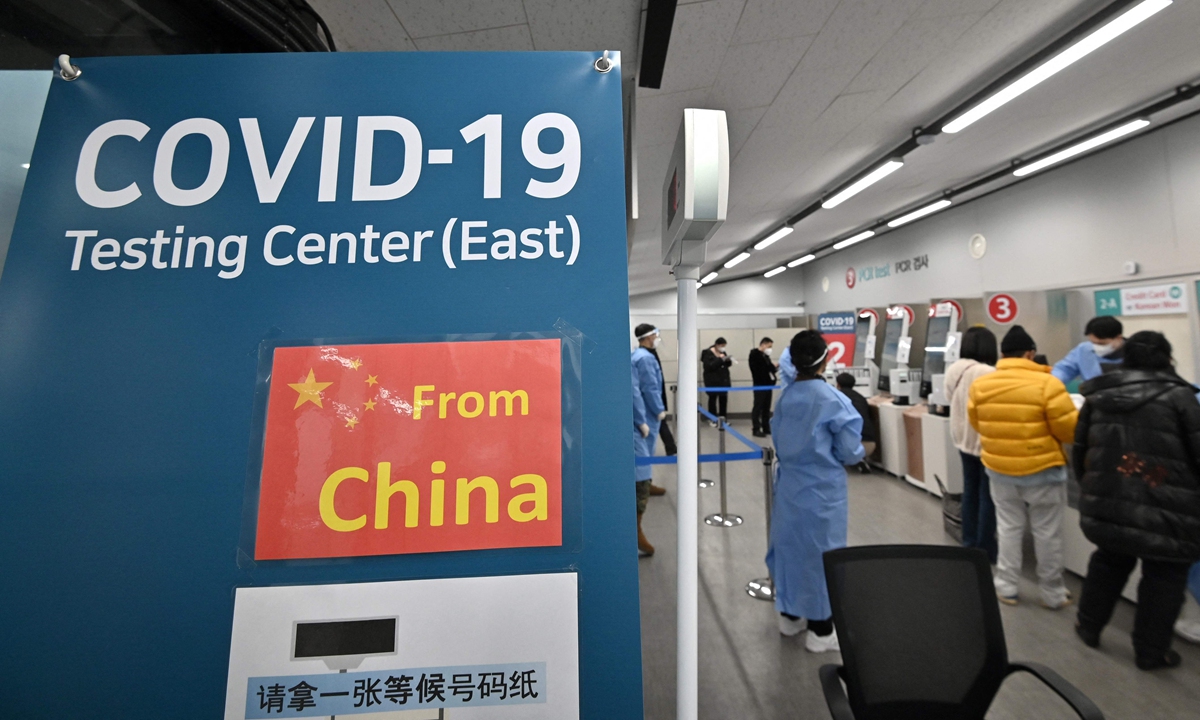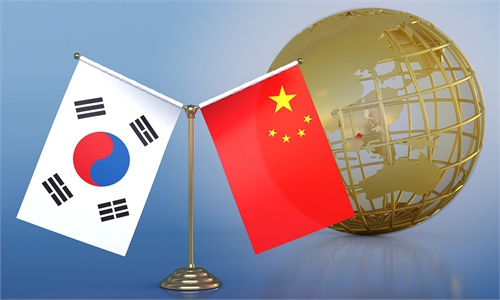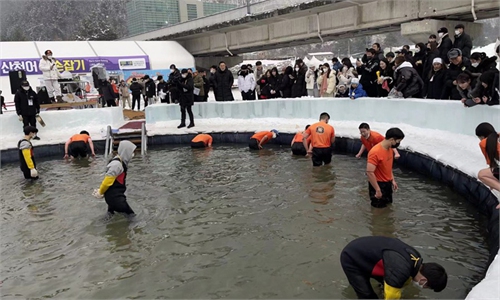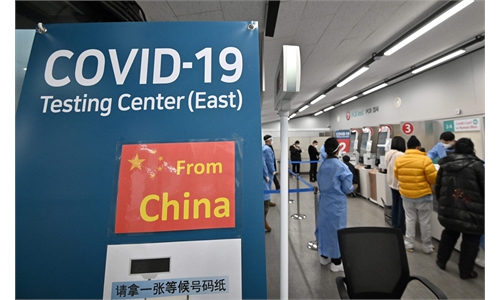China announces first countermeasure against discriminatory travel curbs
By suspending visas for South Koreans, Beijing defends its legitimate rights on the principle of reciprocity: experts

Health workers guide travelers from China at a COVID-19 testing center at Incheon International Airport in South Korea on January 3. Photo: VCG
China imposed its first countermeasure on Tuesday toward discriminatory and unnecessary travel restrictions against travelers from China by suspending short-term visas for South Korean citizens who wants to visit China. The latest measure is considered as China's direct and reasonable response to protect its own legitimate interests, particularly after some countries are continuing hyping up China's epidemic situation by putting travel restrictions for political manipulation despite that many public health experts around the globe have criticized it as a "toxic trend."
China suspends issuing short-term visas for South Korean citizens to travel to China for visit, business, tourism, medical treatment, transit or other personal affairs, with the new adjustment taking effect starting Tuesday, the Chinese Embassy in South Korea said in a statement released on Tuesday.
The decision will be reassessed as soon as South Korea removes its discriminatory travel restrictions targeting travelers from China, the statement said.
Following the move by the Chinese Embassy in South Korea, the Chinese Embassy in Japan also issued a notice on Tuesday to suspended the issuing of ordinary visas for Japanese citizens who want to travel to China without notifying a date for resumption.
The US, Japan and South Korea are among the countries that had announced restrictions on travelers from China, citing concerns that the current surge of COVID-19 cases in China could lead to the emergence of new variants.
When asked about whether China also suspended visa application for Japanese citizens who plan to travel to China, Wang Wenbin, spokesperson of the Chinese Foreign Ministry, told a routine press conference on Tuesday that since China adjusted its COVID management and unveiled the resumption of people-to-people exchanges between China and other countries and regions, many countries have welcomed Chinese travelers but a handful of countries adopted entry restrictions against travelers from China.
China holds the sincerest attitude, with adhering to the fact and fully communicating with relevant countries, introducing in detail the scientific basis and reasons for China's optimization and adjustment of epidemic prevention measures as well as domestic epidemic situation, Wang noted. "But regrettably, some countries ignore science, facts and their own situation by imposing travel curbs against China, toward which China firmly opposes and takes countermeasures."
On January 2, South Korea tightened rules on incoming travelers from China, including allowing them only one port of entry - the Incheon International Airport - and performing COVID-19 tests on passengers after they disembark, Korea JoongAng Daily reported on Monday.
In addition, people traveling from China are required to submit negative COVID test results before boarding the plane to Seoul. This also applies to people coming from Hong Kong and Macao, the JoongAng Daily report said.
Japan also further tightened border controls for travelers from China on Sunday by requiring proof of COVID negative test results, which should be taken 72 hours prior to departure, according to media reports.
The travel restriction has been criticized by health experts from across globe as logistically cumbersome, and a toxic trend. Many countries, unlike the US-led allies including Japan and South Korea, warmly welcome China's adjustment and reopening without putting any extra measures targeting travelers from China, striking a sharp contrast with those tougher rules, which were also called "unacceptable" toward which China will take corresponding measures with the principle of reciprocity.
Legitimate defense
Relations between countries must be built based on mutual respect and equality, which has been recognized as international norms, Li Haidong, a professor at the Institute of International Relations at the China Foreign Affairs University, told the Global Times on Tuesday.
Certain countries including South Korea and the US have come up with an idea to slander and question China's epidemic response measures, and such move resulted in the international communities' query toward China's COVID-19 response, Li said.
"China's latest countermeasures on visas are a legitimate demand which is reasonable and can better protect our own interests," Li said.
In recent days, news that travelers from China have to take a yellow badge (for short-term visa holders) before entry has gained wide attention from Chinese netizens, with more than 190 million views on Chinese twitter-like Sina Weibo as of press time on Tuesday. Some netizens shared their unwelcomed and unsmooth experiences when arriving in South Korea such as mandatory nucleic acid testing, according to media reports.
For example, a large number of South Korean reporters were filming travelers from China when they were forced to wear the yellow badge and some reporters even followed those Chinese travelers like "tracking criminals," according to some posts circulating online.
"South Korea's entry policy toward travelers from China is really the most unfriendly and strictest in the world. Entry inspection, wait for report for two to five hours or even longer, and mandatory quarantine at traveler's own expense for a week if tested positive," a netizen said.
Many Chinese netizens have expressed their discontent over the measures carried out by South Korea toward passengers from China. "I suggest you to delay your travel plan to South Korea," one netizen wrote.
There is absolutely no need to impose travel restrictions on arrivals from Hong Kong and the Chinese mainland, Dennis Lam, a Hong Kong lawmaker and a deputy to the National People's Congress, told the Global Times. When epidemic prevention measures have been eased across the globe, the mainland and Hong Kong have no higher possibility for new variants than any other countries or regions, Lam said.
"It has been three years since the outbreak of the COVID-19 epidemic, and large-scale epidemics and infections have occurred all over the world with most of the global population forming a certain immunity against the virus through self-infection or vaccination, so the virulence of the new variants is no longer as bad as at the beginning of the epidemic," Lam remarked.
On Tuesday, Chinese Foreign Ministry spokesperson Wang said "We once again call on relevant countries to make sure that their COVID response measures are fact-based, science-based and proportionate. COVID response should not be used as a pretext for political manipulation. It should not be discriminatory and should not affect normal cross-border travel and people-to-people exchange and cooperation."
Leo Poon Lit-man of the University of Hong Kong, who is also an expert in various World Health Organization Working Groups for SARS-CoV-2 and influenza viruses, said that it is possible surging caseload could lead to generation of new variants, "but this possibility can also be applied in other countries and cities, for example, the XBB.1.5 subvariant evolved outside China," and there's a major difference between the variants circulating in and outside China.
It is important to continue to do surveillance inside China and share this information with other countries, said Poon, warning that it is also equally important for other countries to do the same level of surveillance. "So whenever there's a new variant coming out in around the globe, we can able to share and exchange the information in a timely manner."
Despite a few countries who have imposed unreasonable travel curbs out of political purposes, many countries took a much more rational attitude.
For example, Singaporean Health Minister Ong Ye Kung explained on Monday that Singapore will not impose pre-departure tests on travelers from China as severe cases can originate from anywhere.
Putting up such requirements, he said, raises the question of travelers from other regions that contribute more infections and severe case, Channel News Asia reported.
"How about local community settings which we know are conducive to spreading the disease and can drive infection numbers and severe cases?" Mr Ong asked.
"By triggering PDT (pre-departure test requirements) on travelers from one part of the world experiencing high infection numbers, are we contributing to an international precedent of imposing tests on travelers from countries going through an infection wave? How will other countries treat travelers from Singapore when we encounter another infection wave?"



